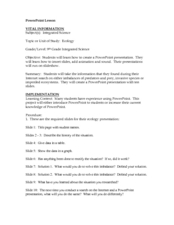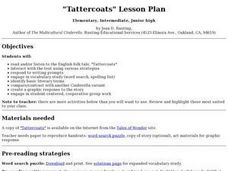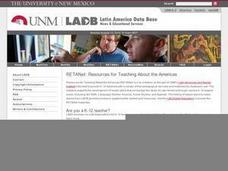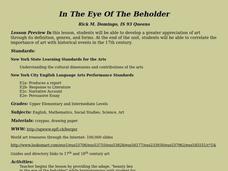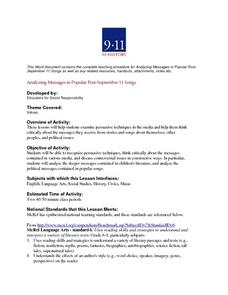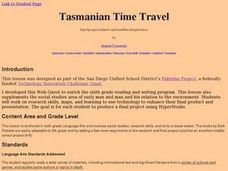Curated OER
Comparing Characters Across Two Short Stories
Ninth graders listen to a read aloud of two short stories focusing on literary devices. The write about the settings and realism of the stories, and decide each main character handles the conflict he faces with nature.
Curated OER
Ecology
Students personify ecology vocabulary and write a one-act play using their knowledge of ecology as the basis for characters, conflict, setting and plot.
Curated OER
Comparing Fairy Tales
Students read and review common fairy tales and come up with a list of characteristics from them. The Teacher models filling out either a compare & contrast graphic organizer comparing two fairy tales.
Curated OER
Tattercoats
Students read the English folktale, "Tattercoats," identify basic literary terms, and respond to writing prompts. They compare and contrast with another Cinderella story version and create a graphic response to the story.
Curated OER
Our School's News
Young scholars work collaboratively in small groups to create and edit various publications to promote their school's activities and accomplishments. Groups work to complete these publications and publish or update them bi-monthly.
Curated OER
The Time I Got Lost
Third graders go through the writing process but substitute paper and pencil with the computer to create a story about "The Time I Got Lost".
Curated OER
Electronic Journals about Latin American Folktales
Students exchange folktales with a key-pal using dialog journal writing. They write out a folktale from their own cultural background and exchange it with students of another. They record their impressions of each other's folktales.
Curated OER
Martin Luther King Jr. Who Is He?
Pupils describe MLk's leadership of the desegregation movement. Students discuss the meaning of non-violent revolution. Pupils identify the difference between their lives and those ofcitizens in 1963. Students write a short essay about...
Curated OER
In The Eye Of The Beholder
Students, in groups, research Rembrandt's life and works. They find critiques of his work, as well. Each group reports their findings back to the rest of the class. Finally, they create abstract drawings and write interpretations about...
Curated OER
911 As History
Students recognize persuasive techniques, think criticaly about the messages contained in various media, and discuss controversial issues in constructive ways. They analyze the deeper messages contained in children's literature, and...
Curated OER
Say It Loud!: A Celebration Of Black Music In America - Gospel Beginnings
Young scholars identify musical characteristics of gospel and sing a gospel selection. They practice the call and response technique. After going through individual parts, they sing the entire song with piano accompaniment.
Curated OER
Stories of Nepal
Students explore folktales and fairy tales from Nepal to help them understand the Nepalese culture, and to compare the stories to the ones the students may know. After reading the stories, students consider what rural life is like in...
Curated OER
Tasmanian Time Travel
Sixth graders perform research using the Internet about the Tasmanian Devil. The project can be presented in a variety of ways. The use of computer software is important for students to know, specifically Hyperstudio.
Curated OER
Growing Seeds
In this science worksheet, learners read 5 different scenarios with varied growing conditions for plants. Students make a prediction for each: Will it grow a little, grow a lot, or not grow at all?



